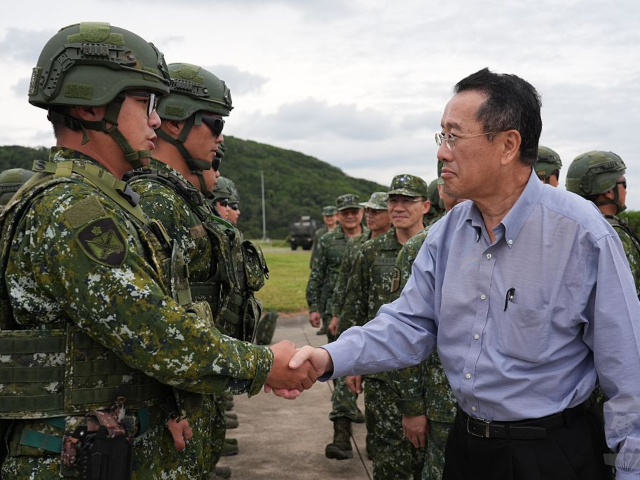Report: Trump Announces Increased Weapons Sales to Taiwan After Aggressive Chinese Military Drills

Two U.S. officials told Reuters on Friday that President Donald Trump is planning to increase arms sales to Taiwan as a means of deterring Chinese aggression.
One of the officials said weapons sales to Taiwan could “easily exceed” the $18.3 billion approved during the first Trump administration.
Arms sales to Taiwan declined sharply to $8.4 billion under President Joe Biden, but the Taiwanese are reportedly more nervous about Trump’s commitment to defend the island, in part because he said during his 2024 campaign that Taiwan should pay more for its defense.
When he was asked during a July 2024 interview with Bloomberg Businessweek if he would defend Taiwan against a Chinese invasion, Trump replied:
I know the people very well, respect them greatly. They did take about 100% of our chip business. I think Taiwan should pay us for defense. You know, we’re no different than an insurance company. Taiwan doesn’t give us anything. Taiwan is 9,500 miles away. It’s 68 miles away from China. A slight advantage, and China’s a massive piece of land, they could just bombard it. They don’t even need to — I mean, they can literally just send shells. Now they don’t want to do that because they don’t want to lose all those chip plants. You know, all those plants and they don’t want to do that.
This interview became the foundation for countless media stories about Trump’s putative reluctance to protect Taiwan from Chinese aggression. China used Trump’s remarks in its propaganda, goading the Taiwanese that under a second Trump administration, Taiwan might “turn from a pawn to a discarded child.”
The Taiwanese government refused to rise to the bait, restating its gratitude for U.S. support and withholding comment until Trump explained exactly how much he thought Taipei should pay for its defense.
“Taiwan and the US share a common responsibility for the Indo-Pacific region of the Taiwan Strait, and we are willing to do more to defend ourselves and protect our security,” Taiwanese Premier Cho Jung-tai said last July.
According to Reuters’ sources on Friday, Trump remains committed to “enhancing hard deterrence” for Taiwan, and the administration sees a dramatic increase in arms sales as a way to express that commitment, while also meeting Trump’s goal of getting Taipei to cover more of its defense costs.
The Trump administration also wants to send a message to the Taiwanese opposition, which currently controls Parliament, and has threatened dramatic cuts to defense spending. U.S. officials have explicitly asked opposition leaders to refrain from slashing the defense budget.
“We’re messaging pretty hard to the opposition: Don’t get in the way of this. This isn’t a Taiwanese partisan question. This is a Taiwanese survival question,” one U.S. official said.
Taiwanese officials said in February they were considering an arms purchase of between $7 billion and $10 billion this year, including more advanced coastal defense missiles. If the deal materializes, it could get Taiwan over halfway to reaching Trump’s target for his second term.
The Taiwanese Presidential Office responded to the Reuters article by noting President Lai Ching-te’s desire to increase defense spending to three percent of gross domestic product (GDP) this year. Taiwan currently spends about 2.45 percent of GDP on defense.
“Taiwan aims to enhance military deterrence while continuing to deepen its security cooperation with the United States,” the presidential office said.
The opposition Kuomintang (KMT) party told Reuters it was “beyond question” that it supports increased defense spending, but it wants some input into the military budget, and how the money is spent.
“Supporting an increased budget does not mean serving as a rubber stamp, nor does it preclude making adjustments or engaging in negotiations regarding the special budget proposals put forth by the DPP administration,” said Alexander Huang, director of KMT’s international department. The DPP is the Democratic Progressive Party of President Lai, which despite its name is the more conservative of Taiwan’s major political parties.
The other major opposition group, the Taiwan People’s Party (TPP), assured Reuters it has “always had smooth communication with the U.S. side and has continued to engage in in-depth dialogue on issues such as national defense and regional security.”
China was not pleased by the report of increased arms sales to Taiwan.
“The Taiwan question is at the core of China’s core interests, and the first red line that cannot be crossed in China-U.S. relations,” Chinese Foreign Ministry spokesman Lin Jian said on Friday.
“China firmly opposes the U.S.’s arms sales to China’s Taiwan region, urges the U.S. to abide by the one-China principle and the three China-U.S. joint communiques,” he said, repeating China’s usual mantra about 40-year-old diplomatic statements.
The third of those communiques, from August 1982, acknowledged that the U.S. would continue to sell arms to Taiwan, and Communist China would continue not to like it. The U.S. pledged to reduce arms sales if Beijing worked toward a peaceful resolution of its differences with Taiwan, which it manifestly has not done. China routinely holds massive, intimidating military drills off the Chinese coast and rehearses a brutal invasion of the island.
Lin urged the United States to “stop selling arms to Taiwan and stop creating new factors that could lead to tensions in the Taiwan Strait,” two days after China staged an obnoxious military drill that managed to simultaneously threaten Taiwan, Japan, and the Philippines.